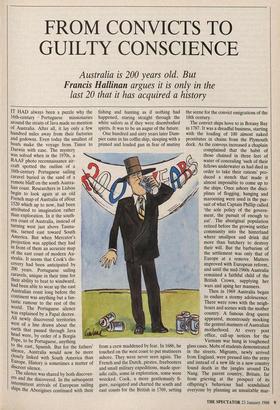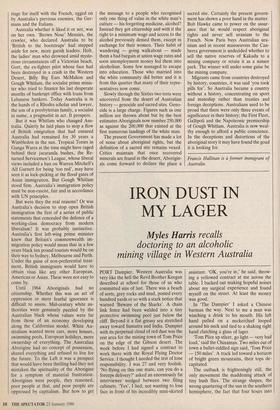FROM CONVICTS TO GUILTY CONSCIENCE
Australia is 200 years old. But
Francis Hallinan argues it is only in the
last 20 that it has acquired a history
IT HAD always been a puzzle why the 16th-century — Portuguese missionaries around the straits of Java made no mention of Australia. After all, it lay only a few hundred miles away from their factories and godowns. Even today the smallest of was solved when in the 1970s, a RAAF photo reconnaissance air- craft spotted the outline of a 16th-century Portuguese sailing caravel buried in the sand of a remote bluff on the south Austra- lian coast. Researchers in Lisbon begin to look again at an old French map of Australia of about 1520 which up to now, had been attributed to imagination rather than exploration. In it the south- ern coast of Australia, instead of turning west just above Tasma- nia, turned east toward South America. But when Mercator's projection was applied they had in front of them an accurate map of the east coast of modern Au- stralia. It seems that Cook's dis- covery had been anticipated by 200 years. Portuguese sailing caravels, unique in their time for their ability to beat to windward, had been able to wear up the east Australian coast long before the continent was anything but a fan- tastic rumour to the rest of the world. The Portuguese silence was explained by a Papal decree. All newly discovered territories west of a line drawn about the earth that passed through Java head were, by order of a Borgia Pope, to be Portuguese, anything to the east, Spanish. But for the fathers' silence, Australia would now be more closely linked with South America than Europe. History is sometimes a matter of discreet silence.
The silence was shared by both discover- ers and the discovered. In the subsequent intermittent arrivals of European sailing ships the Aborigines continued with their fishing and hunting as if nothing had happened, staring straight through the white sailors as if they were disembodied spirits. It was to be an augur of the future.
One hundred and sixty years later Dam- pier came in his coffin ship, sleeping with a primed and loaded gun in fear of mutiny from a crew maddened by fear. In 1686, he touched on the west coast to put mutineers ashore. They were never seen again. The French and the Dutch, pirates, freebooters and small military expeditions, made spor- adic calls, some in exploration, some were wrecked. Cook, a more gentlemanly fi- gure, navigated and charted the south and east coasts for the British in 1769, setting the scene for the convict emigrations of the 18th century.
The convict ships hove to in Botany Bay in 1787. It was a dreadful business, starting with the loading of 100 almost naked prostitutes in chains from the Plymouth dock. As the convoys increased a chaplain complained that the habit of those chained in three feet of water of concealing 'such of their fellows underwater as had died in order to take their rations' pro- duced a stench that made it almost impossible to come up to the ships. Once ashore the disci- plines of flogging, hanging and marooning were used in the pur- suit of what Captain Phillip called `the sole policy of the govern- ment, the pursuit of enough to eat'. The aboriginal population retired before the growing settler community into the hinterland where smallpox and drink did more than butchery to destroy their will. But the barbarism of the settlement was only that of Europe at a remove. Matters improved with European reform, and until the mid-.1960s Australia remained a faithful child of the British Crown, supplying her wars and aping her manners.
Then in 1969 Australia began to endure a stormy adolescence. There were rows with the neigh- bours and scenes with the mother country. A famous drag queen appeared, monstrously mocking the genteel manners of Australian motherhood. At every post office, call-up notices for the Vietnam war hung in toughened glass cases. Mobs of students demonstrated in the streets. Migrants, newly arrived from England, were pressed into the army and instead of a new life in a new country found death in the jungles around Da Nang. The parent country, Britain, far from grieving at the prospect of its offspring's behaviour had scandalised everyone by planning an unsuitable mar- riage for itself with the French, egged on by Australia's previous enemies, the Ger- mans and the Italians.
Australia whether it liked it or not, was on her own. 'Brown Nose' Menzies, the crawler, who declared Australia to be `British to the bootstraps' had stepped aside for new, more garish leaders. Holt, the ladies' man who drowned amid myste- rious circumstances off a Victorian beach, Gort, the ex-fighter pilot whose face had been destroyed in a crash in the Western Desert, Billy Big Ears McMahon and Gough Whitlam, the socialist prime minis- ter who tried to finance his last desperate months of bankrupt office with loans from Lebanese bankers. Today Australia is in the hands of a Rhodes scholar and lawyer, the son of a presbyterian family, a socialist in name, a pragmatist in act. It prospers.
But it was Whitlam who changed Aus- tralia. Quietly he laid plans to stop a flow of British emigration that had ensured Australia had remained for 30 years a Wimbledon in the sun. Tropical Tories in Gunga Warra at the time might have raged behind their jacaranda bushes, the Re- turned Servicemen's League, whose liberal views included a ban on Warren Mitchell's Alf Garnett for being 'too red', may have seen it as lock-picking at the flood gates of Asian immigration. But Gough Whitlam stood firm. Australia's immigration policy must be non-rascist, fair and in accordance with UN principles.
But were they the real reasons? Or was Australia's decision to stop open British immigration the first of a series of public statements that concealed the defence of a working-class democracy from modern liberalism? It was probably instinctive. Australia's first left-wing prime minister knew that Britain's commonwealth im- migration policy would mean that in a few years black ten pound tourists would be on their way to Sydney, Melbourne and Perth. Under the guise of non-preferential treat- ment, British immigrants would have to obtain visas like any other European, American or Asian. These were not easy to come by.
Until 1964 Aboriginals had no citizenship. Whether this was an act of oppression or mere fearful ignorance is difficult to assess. Mid-century white au- thorities were genuinely puzzled by the Australian black whose values were far from those of an economy developing along the Californian model. White Au- stralians wanted more cars, more houses, swimming pools, European holidays, more ownership of everything. The Australian Aborigine had no concept of possession, shared everything and refused to live for the future. To the Left it was a prospect that would have been thrilling had they not mistaken the spirituality of the Aborigine for a symptom of material frustration. Aborigines were people, they reasoned, poor people at that, and poor people are oppressed by capitalism. But how to get the message to a people who recognised only one thing of value in .the white man's culture — his forgetting medicine, alcohol? Instead they got citizenship and with it the right to a minimum wage and access to the alcohol previously denied them, except in exchange for their women. Their habit of wandering — going walkabout — made them a bad bargain at union wage rates and soon unemployment money fed them into alcoholism. Some few managed to escape into education. Those who married into the white community did better and it is from this quarter that many of their repre- sentatives now come.
Slowly through the Sixties two torts were uncovered from the desert of Australian history — genocide and sacred sites. Geno- cide is a large charge. Figures such as one million are thrown about but by the best estimates Aboriginals now number 250,000 as against the 200,000 that existed at the first numerous landings of the white man.
The present Government has made a lot of noise about aboriginal rights, but the definition of a sacred site remains vexed. Critics maintain that once recovered minerals are found in the desert, Aborigin- als come forward to declare the place a sacred site. Certainly the present govern- ment has shown a poor hand in the matter. Bob Hawke came to power on the assur- ance that he would respect aboriginal rights and never sell uranium to the French. Now Paris buys Australian ura- nium and in recent manoeuvres the Can- berra government is undecided whether to sell the native reserves of Kakadu to a mining company or retain it as a nature park. The winner will under some guise be the mining company.
Migrants came from countries destroyed by history, countries, it was said 'you took pills for'. So Australia became a country without a history, concentrating on sport and mateship rather than treaties and foreign deceptions. Australians used to be proud that there were only three events of significance in their history; the First Fleet, Gallipoli and the Napoleonic premiership of Gough Whitlam. Australia is now weal- thy enough to afford a public conscience. In the deceptions and distortions of the aboriginal story it may have found the goad it is looking for.
Francis Hallinan is a former immigrant of Australia.



























































 Previous page
Previous page